Introduction of the ebook: Skin in the Game: The Hidden Asymmetries in Daily Life
Đánh giá : 3.89 /5 (sao)
From the New York Times bestselling author of The Black Swan, a bold new work that challenges many of our long-held beliefs about risk and reward, politics and religion, finance and personal responsibility
In his most provocative and practical book yet, one of the foremost thinkers of our time redefines what it means to understand the world, succeed in a profession, contri From the New York Times bestselling author of The Black Swan, a bold new work that challenges many of our long-held beliefs about risk and reward, politics and religion, finance and personal responsibility
In his most provocative and practical book yet, one of the foremost thinkers of our time redefines what it means to understand the world, succeed in a profession, contribute to a fair and just society, detect nonsense, and influence others. Citing examples ranging from Hammurabi to Seneca, Antaeus the Giant to Donald Trump, Nassim Nicholas Taleb shows how the willingness to accept one’s own risks is an essential attribute of heroes, saints, and flourishing people in all walks of life.
As always both accessible and iconoclastic, Taleb challenges long-held beliefs about the values of those who spearhead military interventions, make financial investments, and propagate religious faiths. Among his insights:
• For social justice, focus on symmetry and risk sharing. You cannot make profits and transfer the risks to others, as bankers and large corporations do. You cannot get rich without owning your own risk and paying for your own losses. Forcing skin in the game corrects this asymmetry better than thousands of laws and regulations.
• Ethical rules aren’t universal. You’re part of a group larger than you, but it’s still smaller than humanity in general.
• Minorities, not majorities, run the world. The world is not run by consensus but by stubborn minorities imposing their tastes and ethics on others.
• You can be an intellectual yet still be an idiot. “Educated philistines” have been wrong on everything from Stalinism to Iraq to low-carb diets.
• Beware of complicated solutions (that someone was paid to find). A simple barbell can build muscle better than expensive new machines.
• True religion is commitment, not just faith. How much you believe in something is manifested only by what you’re willing to risk for it.
The phrase “skin in the game” is one we have often heard but rarely stopped to truly dissect. It is the backbone of risk management, but it’s also an astonishingly rich worldview that, as Taleb shows in this book, applies to all aspects of our lives. As Taleb says, “The symmetry of skin in the game is a simple rule that’s necessary for fairness and justice, and the ultimate BS-buster,” and “Never trust anyone who doesn’t have skin in the game. Without it, fools and crooks will benefit, and their mistakes will never come back to haunt them.” …more
Review ebook Skin in the Game: The Hidden Asymmetries in Daily Life
Skin in the Game is at the same time thought-provoking and original but also contradictory and sometimes absurd.
Let’s start with the cons:
1. I certainly won’t be the first to notice that Taleb can be mean-spirited. But why does he insist on presenting his views in this way? The communication of his ideas, often profound, does not require a mean-spirited or condescending tone. For however brilliant Taleb thinks he is, his skills in persuasion are severely lacking; he’s alienating a significant r Skin in the Game is at the same time thought-provoking and original but also contradictory and sometimes absurd.
Let’s start with the cons:
1. I certainly won’t be the first to notice that Taleb can be mean-spirited. But why does he insist on presenting his views in this way? The communication of his ideas, often profound, does not require a mean-spirited or condescending tone. For however brilliant Taleb thinks he is, his skills in persuasion are severely lacking; he’s alienating a significant readership that may have otherwise been more receptive to his ideas.
Not very far into the book we see Taleb take cheap shots at Steven Pinker, out of nowhere, discussing a topic that has nothing to do with any of Pinker’s actual ideas or positions. One wonders why Taleb cannot just present his ideas without the incessant personal attacks and condescension.
2. His overall philosophy appears to be self-refuting. He reviles “intellectuals,” professors, and thinkers while praising “doers” and men of practice. He’s particularly distrustful of those who give advice for a living. Here’s Taleb:
“Avoid taking advice from someone who gives advice for a living, unless there is a penalty for their advice.”
So should we then ignore this advice? As far as I can tell, Skin in the Game is a work of philosophy, an intellectual exercise that argues against the value of intellectual exercise. This is the same self-refuting logic of relativism—in that the statement “everything is relative” is self-refuting because the statement itself needs to be absolute.
If Taleb is wrong in any part of his philosophy it doesn’t appear that he would incur any penalty (no skin in the game). The upside for him is book sales with little to no downside risk, so by using his own logic we should conclude to not trust him.
Also, to the extent that you believe ideas have power you might find yourself disagreeing with Taleb’s extreme position that no good ideas could possibly come from someone in an academic position (particularly from the reviled economists).
Except that Taleb uses economic theories to frame his thinking. The Tragedy of the Commons, something Taleb discusses in his book, was developed by the economist William Forster Lloyd in his armchair. Even Taleb’s Black Swan concept is a reformulation of the Peso problem developed by…economists.
I’m sure anyone can think up examples, rather easily, of useful ideas that were discovered by intellectuals or from university research. How about Einstein’s theory of relativity, which preceded GPS technology, which wouldn’t exist without it.
3. Taleb obsesses about the superiority of practice over academics and theory. This is a questionable proposition.
As just one example, a recent study in the American Journal of Medicine concluded that “patients whose doctors had practiced for at least 20 years stayed longer in the hospital and were more likely to die compared to those whose doctors got their medical license in the past five years.”
My own personal experience corroborates this, as a medical student was able to correctly diagnose what the attending physician had missed on a trip to the ER. Very experienced, practical individuals sometimes perpetuate bad habits and fail to keep informed of the theories and academics that lead to better practice. This point is completely lost on Taleb.
4. Taleb’s definition of rationality as any action that promotes survival is patently false, as a simple thought experiment can show. Imagine a hypothetical survival machine is available for your use. By plugging yourself in, it will guarantee and maximize your life span and, on a social scale, maximizes reproduction. The price is that the machine also inflicts a high degree of pain and cuts you off from contact with other people.
According to the logic of Taleb, the rational thing to do would be to plug into this machine. Of course, no one would volunteer to do this because survival is not what motivates rational behavior. Any rational agent would choose one year of pleasant life over 100 years in the survival machine, because actions have value according to how they promote or are perceived to promote well-being or pleasure.
Taleb, using this more believable definition of rationality, could have used it to argue the same points, namely how religious belief cannot be called irrational if it promotes well-being, which includes psychological well-being and survival but not survival alone.
The pros:
That Taleb is antagonistic and holds some questionable views does not mean that he’s wrong about everything. When not being demeaning or taking extreme positions, Taleb writes about some of the most original, thought-provoking, and profound ideas. And even when you find yourself disagreeing with him, he makes you think. For this reason alone, the book is worth checking out.
The idea that the extent of people’s stakes in particular outcomes is a critical yet underrated determinant of events is a profound idea with several implications, which Taleb skillfully explores throughout the book. And his idea that you should have to pay some kind of penalty for decisions that negatively impact others—risk sharing vs. risk transfer—is a solid framework for thinking about a host of issues. Of course, these ideas would be easier to swallow if presented with a little more humility, but I suppose we should know what to expect from Taleb by now.
…more


 Đang tải dữ liệu
Đang tải dữ liệu
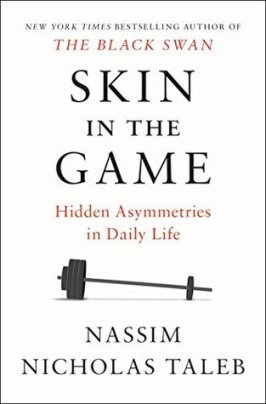
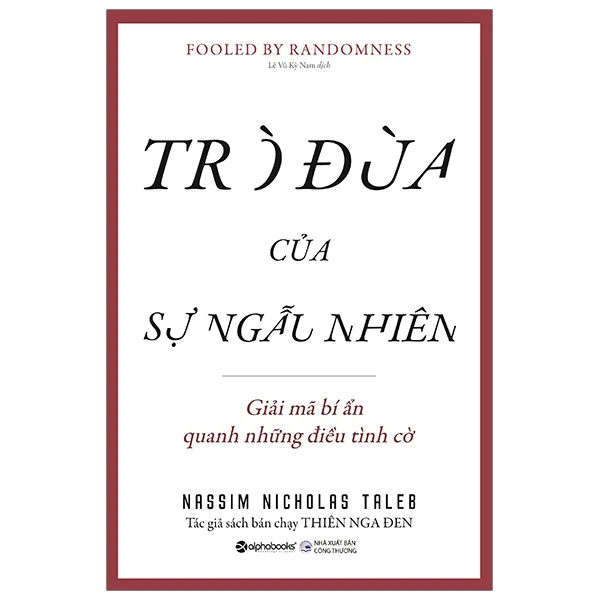

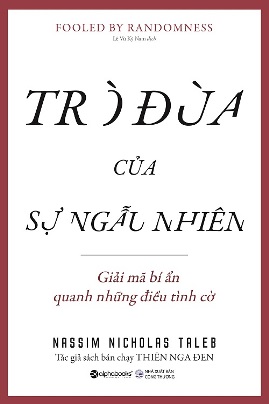



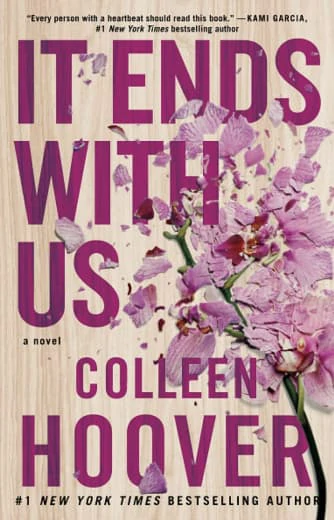

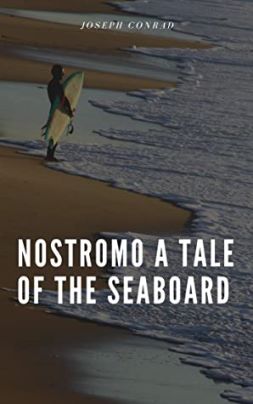
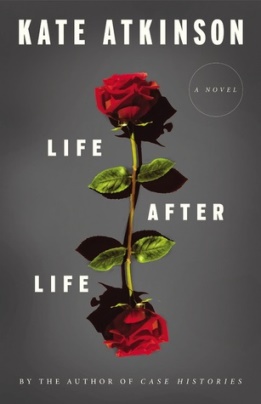


Chia sẻ ý kiến của bạn